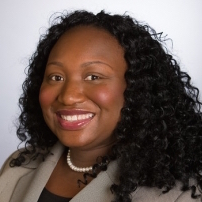Data from the Centers for Disease Control and Prevention show that 66 percent of new Black mothers breastfeed. For new White mothers, 84.3 percent begin to breastfeed. Six months after giving birth, 39.1 percent of African Americans mothers are still breastfeeding. For Whites, the figure is 57.9 percent.
 Ifeyinwa Asiodu, an assistant professor of the School of Nursing at the University of California, San Francisco, is the lead author of research which sought to determine the cause of the racial disparity in breastfeeding rates between Blacks and Whites. Most experts, including the federal government, say that the lower incidence of breastfeeding among African Americans contributes to overall racial health disparities for Blacks of all ages.
Ifeyinwa Asiodu, an assistant professor of the School of Nursing at the University of California, San Francisco, is the lead author of research which sought to determine the cause of the racial disparity in breastfeeding rates between Blacks and Whites. Most experts, including the federal government, say that the lower incidence of breastfeeding among African Americans contributes to overall racial health disparities for Blacks of all ages.
Dr. Asiodu’s said that “the infant feeding decision doesn’t just involve the lactating person. There are a lot of different influences that either support or hinder.” The mothers interviewed for study for the most part wanted to breastfeed but were hampered by systemic, institutional and cultural barriers. Limited family leave and the demands of school made it difficult for many to meet their breastfeeding goals. Many didn’t have adequate resources or support, such as help with child care or secure living arrangements, within their communities. Some mothers lacked role models that might have helped them persevere. “They didn’t necessarily see successful breastfeeding experiences among either family or friends,” says Dr. Asiodu.
Dr. Asiodu’s research found that the relatively stingy family leave laws in the U.S. mean that new mothers who can’t afford to take unpaid time off from work have a short window in which to establish secure breastfeeding relationships with their babies. For working mothers, breastfeeding requires discretionary time for feeding or pumping breast milk – time that is in shorter supply among those with service, retail or other blue-collar jobs than among women with executive or professional positions.
Dr. Asiodu is a graduate of the University of Southern California in Los Angeles. She holds a master’s degree and a Ph.D. in nursing from the University of California, San Francisco.
The full study, “Infant Feeding Decision-Making and the Influences of Social Support Persons Among First-Time African American Mothers,” was published in the Maternal and Child Health Journal. It may be accessed here.











Jahnes love. I am really happy that this subject is being researched. We do need to provide the support system to black mothers who want to breastfeed or nurse their babies. I was blessed to be able to nurse all 4 of my living children from birth and for about 2 to 5 years. I feel that in so doing, my children became closer to me, emotionally, psychically and physically. They also had fewer health problems. The time that it took to breastfeed my children may have hindered my ability to grow in my career and to advance academically. But, I believe that I did my duty and I am glad. Blessed love.
Great research project! Much needed so that policy can follow.